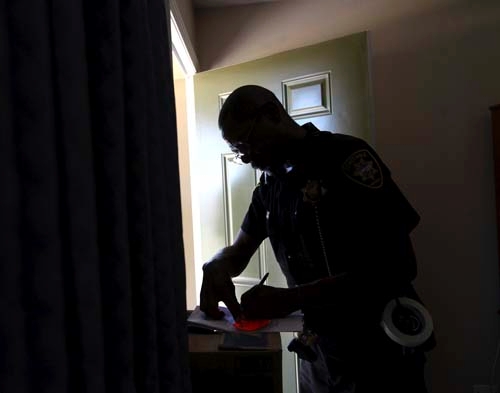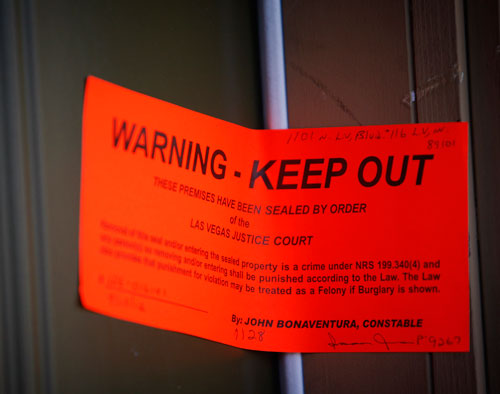Local evictions dropping, but Las Vegas still leads nation
The young woman living in the two-story home in east Las Vegas hurried to dress her two little girls and pack what few belongings she could in 20 minutes.
Sgt. Dan Mahler of the Las Vegas Township constable's office gave her a little extra time after knocking on her door around 10:30 a.m. with an immediate eviction notice. He had already posted the 24-hour summary eviction notice the previous day.
The woman had no clue what he was talking about.
"Are you Maria?" Mahler asked, showing her the name on the paperwork.
That's her mother. She makes a call and puts Mahler on the phone with Francisco, who is also named on the paperwork. The man asks for another day.
"Can't do it. You've gotta go," the sergeant said.
What if he comes up with the rent money tonight?
"That's between you and your landlord," Mahler responded.
A locksmith, Joey, shows up to change the lock. When the job is finished, Mahler drives off, leaving the woman and her children and her brother - who had come down from an upstairs bedroom - standing in the driveway, both on their cellphones calling relatives and friends they hadn't talked to in a while.
Mahler goes to his next assignment, a lockout at Sahara Gardens Apartments. He did a lockout at Clifford Place Apartments and Palm Terrace Apartments earlier in the morning, as well as an immediate eviction at Palm Grove Mobile Home Park, where the tenant had already vacated the premises, leaving a sink full of dirty dishes, the refrigerator wide open, a single mattress in the bedroom, two sets of golf clubs, and a stained, torn couch.
"Half the time they're gone, don't worry about it, especially apartments," Mahler said.
A BUSY SCHEDULE
On a typical day, the retired 25-year Las Vegas police officer might serve six to eight eviction notices in two east Las Vegas ZIP codes, along with delivering half a dozen court documents to garnish wages and freeze bank accounts.
He's busy, but not like he was a couple of years ago.
Through October, the Las Vegas constable's office had served 17,365 evictions, public information officer Lou Tommin reported. They're on pace to fall far short of the 36,987 evictions in 2011, which was down from a peak of around 40,000 in 2010, Toomin said.
Still, Las Vegas leads the nation in evictions, attracting national and international media attention. CBS, for example, recently televised a report on evictions in Las Vegas.
A big part of the decline is Assembly Bill 284, Nevada's robo-signing law, Toomin said. The law requires lenders to provide affidavits of "personal knowledge" of who owns the mortgage note before they can start the foreclosure process.
Banks have retrenched in their efforts to oust delinquent homeowners. Since the law took effect in October 2011, notice of default filings have decreased by about 70 percent in Clark County, according to online listing service ForeclosureRadar.com.
But notice of default filings are rising again. ForeclosureRadar reported 1,731 notices of default filed in Clark County in October, up 93 percent from a year ago. Notices of trustee sale, which serve as the homeowner's final notice before sale, remain depressed at 1,017, down 70 percent from a year ago.
"That law's a big pain and does more damage than good," Toomin said. "If they (banks) can't come up with the original loan documents and can't do a foreclosure, people get to live in the house rent-free until the court sorts this out."
North Las Vegas Constable Herb Brown posted just two foreclosure evictions during the first week of November, compared with eight to 10 postings a week in the middle of last year. The law has made it harder for banks to foreclose, he said.
Regular evictions rose from 2,321 in 2011 to 2,663 this year, Brown said. Most of them are for rent and lease violations, sometimes as many as 25 a day.
"We wonder where people go," Brown said. "They go to another apartment complex. Younger kids tried to strike out on their own and they move back with their parents."
THE COST OF EVICTION
The eviction process costs anywhere from $100 to $200 from start to finish, said Steve Kilgore, deputy director of the Henderson constable's office. The filing is about $20, plus $2 a mile for serving the papers. Court fees are extra.
There are several types of eviction notices. The five-day notice to pay rent or surrender the premises is the quickest method for the actual lockout. No further notice is required and the landlord can proceed directly to the eviction filing and constable's lockout.
The three-day nuisance notice gives the tenant three days to fix a problem, and has nothing to do with rent payment. It's followed up by a five-day unlawful detainer notice at an additional cost.
The 30-day notice applies to landlords who want the property back for any reason. This notice cannot be served if a lease agreement is in effect. A five-day unlawful detainer notice must follow.
Norma McMahan, general manager for Legal Process Service in Nevada, recommended that landlords and their agents seek legal advice for eviction proceedings on foreclosure properties. Eviction time frames can vary and hinge on the court filing and constable's scheduling.
"Our trend seems to be quite a bit of commercial evictions, which is expected with the economic downturn," McMahan said. "I think foreclosures are starting to fall a little bit, but we are seeing more commercial evictions. It's feeling like things are starting to settle down."
Overall, evictions are trending downward in Henderson, Kilgore said. He counted 484 evictions in the third quarter, compared with 403 in the year-earlier period. The total through the third quarter was 1,353, down 3.5 percent from 1,403 a year ago.
Kilgore said Henderson's jurisdiction is much smaller than Las Vegas, which serves the city of Las Vegas and unincorporated Clark County. That could be why the decrease in evictions was not as steep in Henderson, he said.
Foreclosures are codified by a different standard and it's difficult to separate them from a standard writ of restitution, Kilgore said.
"Foreclosure figures are almost inherently ambiguous because banks are holding on to properties," he said. "I have this sense that we hit the bottom of the trough and we're making some sort of climb out. The climb is certainly not an enthusiastic one, but our darkest hour is behind us. Still, it's not time to raise the flag."
BOULDER CITY MOSTLY SPARED
Boulder City has been somewhat spared by the foreclosure crisis, Boulder Township Constable Steve Hampe said. He's served 50 to 60 eviction notices this year, compared with 35 to 40 last year.
Not many of them have been foreclosures. Banks are more amicable, offering homeowners cash for keys in many foreclosures, he said.
"I think we've been pretty lucky," Hampe said. "Our business has gone up a little, but not as much of an upswing in (foreclosure) evictions. We haven't been hit as hard as other places. I think it's the area. We're a little more affluent and more fortunate."
Knowing whether a rental property is in foreclosure is very important, Toomin said. Even if the rent is paid on time, if the unit is foreclosed upon, renters may still be evicted by the new owner.
Although state law requires a landlord to disclose in writing to a prospective tenant if the property to be rented is in foreclosure, people do not always comply with the law and there is no similar obligation as to current tenants.
TARGETS FOR IMPOSTORS
Toomin recently received a phone call from a man in North Carolina who said squatters had overtaken his house in Las Vegas.
His caretaker had gone by to check on the home and the key no longer fit. Somebody had changed the lock and rented out the house. The tenants produced a signed lease agreement with first and last months' rent payment and security deposit.
Now the homeowner has to serve an eviction notice. That happens a lot in Las Vegas, where an estimated 5,000 to 8,000 homes are sitting vacant, easy targets for vandals and impostors, Toomin said.
"They drive through neighborhoods looking for empty houses and they advertise it on Craig's List," he said. "They meet you at the home, open up the house and ask for rent and security. The guy takes the money and runs and is never heard from again."
The renters may be victims of fraud, and they can file a report with the Metropolitan Police Department. But from the homeowner's perspective, they're squatters, Toomin said. The homeowner from North Carolina is working to provide notarized documents proving ownership and obtain a court order for eviction.
"It's been very difficult to get squatters out because Metro shows up and says it's not criminal, it's a civil matter and you have to go to court," Toomin said. "That takes forever. People go to court and ask for a stay. I know a lady that stayed in her house for two years."
Clark County has 11 constable offices that work in conjunction with the courts in serving all civil documents required for court use and processing and eviction notices. Deputies are not police officers, but they are agents of the law.
Contact reporter Hubble Smith at hsmith@reviewjournal.com or 702-383-0491.



















